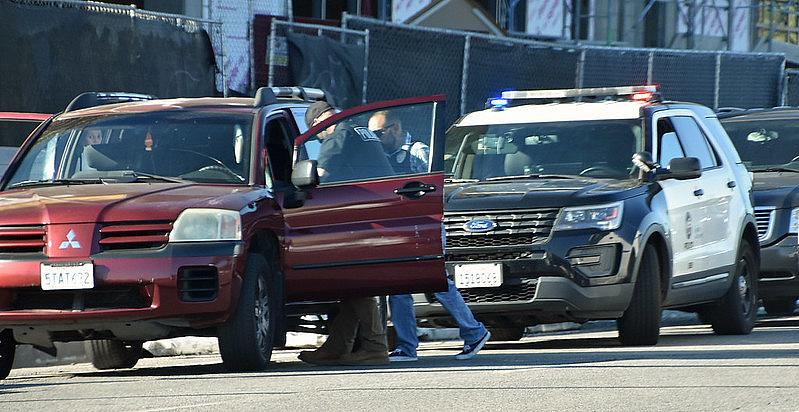Reporting on the long shadow of the LAPD’s data-driven policing programs

(Photo by Chris Yarzab via Flickr/Creative Commons)
Over the past decade, data-driven technologies and algorithms have quickly spread among police departments across the nation as tools used to predict where and who will commit crimes.
One of the early adopters of these popular tools was the Los Angeles Police Department, which implemented Operation LASER and PredPol in 2011. In general terms, these programs draw data from prior crime reports — like the location and time of property crimes and theft — and feed it into an algorithm, which then identifies hot spots or trigger points where crime is most likely to occur.
Additionally, LASER uses past crime and arrest data about offenders to create a list of possible suspects or “people of interest,” who are presumed to be at a higher risk of reoffending and are more closely watched by law enforcement.
But throughout the years, and despite their widespread allure, data-driven policing programs have come under fire nationwide, particularly in Los Angeles, a city with a long history of police abuse and brutality.
My three-part series on these programs featured civil rights advocates and surveillance experts who have long argued that these technologies reinforce structural racism by targeting low-income and ethnic communities, mainly Latino and Black individuals in South Central, Boyle Heights and East LA, as well as unhoused people in Skid Row. The long list of experts I spoke with during my reporting included attorney Albert Cahn of the Surveillance Technology Oversight Project; Emily Tucker of Georgetown Law Matthew Guarigilia of the Electronic Frontier Foundation; and Aqueela Sherrills, a former gang member who has worked with the with the LAPD and other police departments across the nation to reimagine public safety.
One of the most insightful interviews I conducted was with activitst and former Pakistani pilot Hamid Khan, who leads the Stop LAPD Spying Coalition, a Skid Row-based organization that played a crucial role in raising awareness of the potential dangers of PredPol and LASER. The coalition, which calls for the abolition of law enforcement, gathered extensive LAPD documents, crime reports and maps through public records requests and lawsuits filed against the department for failure to release some records. Activists subsequently released a lengthy report exposing the inner workings of both programs. Simultaneously, the organization mobilized the community and applied constant pressure on the LAPD until both programs were discontinued a few years ago. The victory, however, was short-lived, as the LAPD quickly repackaged their data-driven tools and created the second generation of these programs: Data-Informed Community-Focused Policing.
The organization also put together an interactive map identifying LASER zones where both adults and minors had been killed by the LAPD. Khan’s teams also uncovered that rapper Nipsey Hussle’s former store in South Central had been identified by the program as a LASER zone. The artist was, too, killed here –– not by the LAPD though. Additionally, an LAPD letter also revealed that the artist and his business partner had been asked by law enforcement to cooperate to end gang activity in the area. An interview request that I placed to a potential source to learn more on this matter was met with a checkbook demand, which I declined.
The coalition’s work also raised questions about the death of 16-year-old José Juan Méndez and 14-year-old Jesse Romero, both killed by the LAPD in LASER zones in Boyle Heights in 2016. The incidents led to significant community mobilization and protests.
In the view of Sol Márquez, a member of the Chicano-led organization Centro CSO, the overpolicing of Boyle Heights did not improve the perception of safety among residents. Rather, it heightened emotions, created distrust in law enforcement, failed to deter crimes and constituted harassment.
The LAPD declined to consider granting me a recorded interview without receiving a list of questions in advance, a demand that I refused to comply with. This policy is all the more concerning given that Latinos in LA have been impacted by predictive policing and that this may be the first long-form, in-depth series released in U.S. Spanish-language outlets exploring LASER and PredPol.
